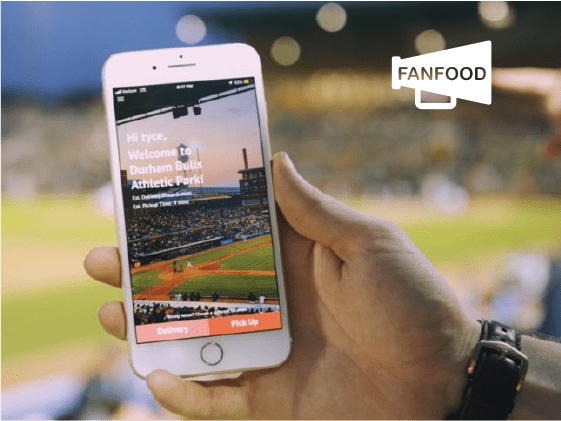www.thespoon.tech • October 3, 2019

Most of the time, when an entrepreneur has an idea, they immediately focus on how to break into the big leagues of their industry. But Chicago-based startup FanFood likes being in the minor leagues — literally.
FanFood provides mobile ordering for concession stands at stadiums and arenas, but the company is focusing on smaller venues like those in baseball’s minor league, colleges and even high schools. FanFood works with individual concessions at each location to let fans order food ahead via mobile app and have it ready for express pickup or delivered directly to their seat.
Version 1, which is out now, is a standalone FanFood app that consumers have to download in order to use the service. While the forthcoming V2 will still work as a standalone app, it will also feature mobile browser ordering and can also be integrated into a venue or team’s existing app.
It’s not uncommon for this type of in-seat accommodation to be implemented or piloted at large venues. Both Yankee Stadium and Dodger Stadium now have Postmates Pickup, for example, and WaitTime is an app that tells you how long the food lines are at American Airlines Arena concession stands. But FanFood is skipping the big time parks (for now) to bring these features to small-town venues.
“Convenience is an expectation,” FanFood Co-Founder and CEO, Carson Goodale, told me by phone this week. And given the rise in meal delivery services, it’s not hard to imagine that soon most people will expect even more meal convenience wherever they go. And that includes small-town arenas.
Aside from the fact that there are tons of concession stands at arenas big and small across the country (especially when you count regional colleges and high schools), there’s another reason Goodale is focusing on smaller venues. “The Sales cycle is smaller on the smaller stadiums,” Goodale said. With less on the line, as it were (fewer people, fewer concessions, smaller brand names, less money, etc.), there are fewer levels of bureaucracy for FanFood to get through.
“We’ll be in 100 venues by the end of the year,” Goodale said, including locations such as Durham Bulls Athletic Park, University of North Carolina, Chapel Hill, and Owasso High School in Oklahoma. It’s easy to see why minor league parks and even large colleges might want to use FanFood: Fans don’t have to miss any of the game when getting their food, and the concession and venue operators can ideally generate more revenue, get analytics around what food is ordered and when to staff events with more people.
For high schools though, there’s the added benefit of fundraising. Goodale told me that most concessions at high school games are run by boosters and are used for athletic program fundraising. In a case study video on the FanFood site, Owasso High School said that FanFood bumped sales up by 20 percent, or added roughly another $6,000 in revenue. That’s money that can go towards uniforms, equipment and travel.
But perhaps the most interesting thing about FanFood is its ability to create virtual concession stands. Just as Uber Eats can create virtual restaurants that exist only inside its app, so too can FanFood do the same for a concession stand. If food is ordered via app and picked up directly from a smart cubby or delivered to a seat, there’s no need to build out and staff a a full operation with cash registers, digital signs, etc. inside a stadium where space is already limited.
Right now, the biggest issue for FanFood seems to be scaling up. While smaller stadiums may be low hanging fruit, there are a lot of them, spread out across the country, and FanFood sells to each concession stand individually. The company charges a one-time setup fee, licenses the platform to each concession stand and takes a percentage of any convenience fee tacked on to an order (e.g., 99 cents to deliver to a seat). FanFood has only raised $2 million in seed funding at this point, so it doesn’t have a massive warchest to go out and spend.
But by playing small ball, FanFood may not need to spend as much to capture a market looking for convenience. Game on.
